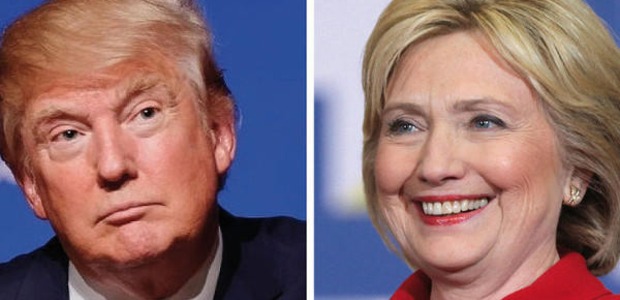advertisement
Where Clinton and Trump stand on tech issues
This presidential election presents one of the clearest choices in U.S. history between two major-party candidates. But one thing has…

This presidential election presents one of the clearest choices in U.S. history between two major-party candidates. But one thing has been rarely discussed: Where do the candidates stand on tech issues?
Whether it’s net neutrality, investing in tech infrastructure, building an educational pipeline of tech workers, privacy or any of several other tech issues, Donald Trump and Hillary Clinton take very different approaches. It’s worth looking at their varied stances.
Let’s start with net neutrality. For Clinton, it’s straightforward. She supports the FCC’s rulings in favor of net neutrality. Trump opposes the concept. His primary statement on the matter came in a tweet in which he called President Obama’s support of net neutrality an “attack on the internet.” His full tweet is: “Obama’s attack on the internet is another top down power grab. Net neutrality is the Fairness Doctrine. Will target conservative media.”
advertisement
As for whether the government should be allowed to force tech companies to give the FBI back doors so the government can get access to people’s phones even if they’re locked, Trump is for it. In February of this year, he called for a boycott of Apple unless that company developed software to allow the FBI to break into the phone of the San Bernardino mass shooter. Clinton’s views are much closer to Apple’s on the matter. Her tech position paper says, “Hillary rejects the false choice between privacy interests and keeping Americans safe,” which mirrors the stand of Apple CEO Tim Cook. She favors setting up a commission on encryption, privacy and security to come up with proposals for balancing safety and privacy.
Clinton supports expanding broadband access and developing next-generation mobile 5G technology, as part of her $275 billion plan in infrastructure spending, which would also put money toward roads, bridges, airports and railways. Trump hasn’t put out any plans for increasing broadband access. He has, however, recommended that the government limit access to the internet in some instances. Late last year, he said that the government should consider “closing that Internet” in order to stop Islamic jihadists from recruiting people in the United States. He said, “We’re losing a lot of people because of the Internet. We have to see Bill Gates and a lot of different people that really understand what’s happening. We have to talk to them about, maybe in certain areas, closing that internet up in some ways. Somebody will say, ‘Oh freedom of speech, freedom of speech.’ These are foolish people.”
When it comes to making sure that the U.S. provides a pipeline of people for the tech industry, Clinton has a comprehensive plan that includes investments in computer science and STEM education in the public schools, training additional computer science teachers and giving grants to programs to retrain workers for tech-related jobs. Trump hasn’t said much about tech education. Instead, he would target what he believes are abuses in the H-1B visa program.
advertisement
On patent reform, Clinton supports the Obama administration’s efforts to curb patent troll abuse. Trump hasn’t mentioned the issue.
Clinton has weighed in on how to protect workers in the growing gig economy in which people work freelance or part time for companies such as Uber but don’t have the protections and safety net that are commonly enjoyed by people who work full time for businesses. She wants worker benefits to be portable across gigs and supports the Affordable Care Act’s subsidizing of people who don’t get health insurance from an employer and need help paying. Trump hasn’t talked about the gig economy and would kill the Affordable Care Act.
Trump has on occasion attacked tech companies and threatened them or their founders, something Clinton hasn’t done. For example, he has frequently attacked Amazon founder Jeff Bezos, claiming that he bought The Washington Post in order to curry favor with politicians. He said that he’d target Amazon for retribution if he became president: “Believe me, if I become president, oh, do they have problems. They’re going to have such problems.” He has also criticized Apple for building its iPhones in China, promising that if elected, “I’m going to get Apple to start making their computers and their iPhones on our land not in China.”
advertisement
Clinton has far more endorsements from tech executives than does Trump. Among those who have publicly endorsed her are Sheryl Sandberg, chief operating officer of Facebook; Eric Schmidt, executive chairman of Alphabet; Reed Hastings, founder and CEO of Netflix; Drew Houston, founder and CEO of Dropbox; David Karp, founder and CEO of Tumblr; Barry Diller, chairman and senior executive of IAC and Expedia; and many others. (Here’s a partial list as of late June.) She draws support from Republican as well as Democratic tech executives. Meg Whitman, the CEO and president of Hewlett Packard Enterprise and former president and CEO of eBay, recently endorsed her. Whitman ran unsuccessfully for governor of California as a Republican in 2010. Trump’s only notable tech endorser has been Peter Thiel, co-founder of PayPal and Palantir and a director at Facebook.
So if you care about tech, closely examine both candidates’ policies toward it, and vote accordingly.
——————————————————–
Preston Gralla is the author of more than 45 books, including Windows 8 Hacks (O’Reilly, 2012) and How the Internet Works (Que, 2006).
——————————————————-
Original Article URL:
http://www.computerworld.com/article/3107216/it-management/where-clinton-and-trump-stand-on-tech-issues.html